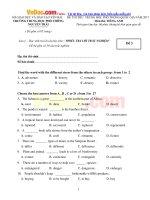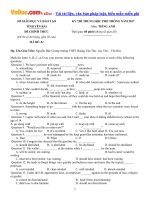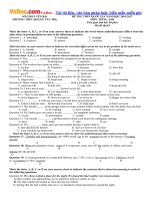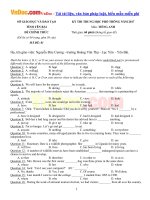Tải Đề thi thử THPT Quốc gia năm 2017 môn Tiếng Anh trường THPT Thác Bà, Yên Bái CÓ ĐÁP ÁN (1) - Thư viện Đề thi THPT Quốc gia môn Tiếng Anh năm 2017
Bạn đang xem bản rút gọn của tài liệu. Xem và tải ngay bản đầy đủ của tài liệu tại đây (127.74 KB, 6 trang )
<span class='text_page_counter'>(1)</span><div class='page_container' data-page=1>
SỞ GD&ĐT YÊN BÁI
<b>TRƯỜNG THPT THÁC BÀ</b>
<i>(Đề thi gồm: 04 trang)</i>
<b>ĐỀ THI THPT QUỐC GIA NĂM 2017</b>
<b>Môn: TIẾNG ANH – ĐỀ SỐ 01</b>
<i>Thời gian làm bài: 60 phút, không kể thời gian phát đề</i>
<i><b>Họ và tên thí sinh:……… SBD:………</b></i>
<i><b> Mark the letter A, B, C, or D on your answer sheet to indicate the word whose underlined part</b></i>
<i><b>differs from the other three in pronunciation in each of the following questions. </b></i>
<i><b>Question 1: A. provided </b></i> <i><b>B. cooked </b></i> <i><b>C. invited </b></i> <i><b>D. started </b></i>
<i><b>Question 2: A. head </b></i> <i><b>B. spread </b></i> <i><b>C. breath </b></i> <i><b>D. crease</b></i>
<i><b> Mark the letter A, B, C, or D on your answer sheet to indicate the word that differs from the other</b></i>
<i><b>three in the position of the primary stress in each of the following questions. </b></i>
<b>Question 3: A. arrested </b> B. impartial C. temporary D. protected
<b>Question 4: A. business </b> B. opponent C. specialize D. agency
<i><b> Choose A, B, C, or D on your answer sheet to indicate the word or phrase CLOSEST in meaning to</b></i>
<i><b>the underlined part in each of the following questions. </b></i>
<i><b>Question 5: Don't be concerned about your mother's illness; she'll recover soon. </b></i>
A. surprised at B. worried about C. embarrassed at D. angry with
<i><b>Question 6: Although they hold similar political views, their religious beliefs present a striking contrast. </b></i>
A. significant difference B. interesting resemblance
C. minor comparison D. complete coincidence
<i><b> Mark the letter A, B, C, or D to indicate the word or phrase that is OPPOSITE in meaning to the </b></i>
<i><b>italic part in each of the following questions.</b></i>
<i><b>Question 7: This shouldn’t be too taxing for you.</b></i>
A. comfortable B. demanding C. easy D. relaxing
<i><b>Question 8: The Germany’s war hysteria has accounted for its people’s hostility towards foreigners. </b></i>
A. disease B. ceremony C. malaria D. serenity
<i><b> Mark the letter A, B, C, or D on your answer sheet to show the underlined part that needs</b></i>
<i><b>correction in each of the following questions.</b></i>
<b>Question 9: A dolphin can communicate with other by making distinctive sounds. </b>
A. making B. sounds C. communicate D. other
<b>Question 10: Rock music was original a mixture of country music and rhythm and blues. </b>
A. Rock music B. original C. music D. and
<b>Question 11: Wind is the motion that occurs when lightest air rises and cooler heavier air replaces it. A. it </b>
B. that occurs C. lightest D. cooler
</div>
<span class='text_page_counter'>(2)</span><div class='page_container' data-page=2>
<i><b> Mark the letter A, B, C, or D on your answer sheet to indicate the correct answer to each of the</b></i>
<i><b>following questions. </b></i>
<b>Question 13: - Susan: "Oh my God, I've missed my bus." </b>
<b> - Christ: "___________. Another will come here in ten minutes." </b>
A. Don't worry B. Thank you C. Don't mention it D. I hope so
<b>Question 14: College students are becoming less dependent_______ their teachers. </b>
A. on B. with C. of D. to
<b>Question 15: She is the woman about_____________ I told you. </b>
A. which B. whose C. whom D. that
<b>Question 16: - Jack: "What's wrong with you?" </b> <b>- Jill: "_____________." </b>
A. I'm having a slight headache B. Thank you very much
C. Yes, I was tired yesterday D. No, I don't care
<b>Question 17: How long ago_____________ to learn French? </b>
A. would you start B. did you start C. were you starting D. have you started
<b>Question 18: - Mary: "Do you mind if I sit here?" - Laura: "________________" </b>
A. Don't mention it. B. My pleasure. C. No, not at all. D. Yes, why not?
<b>Question 19: _____________ he was tired, he still watched the final match on TV. </b>
A. Though B. However C. Despite D. Because
<b>Question 19: Nowadays, most students use_______ calculators in their studies and examinations. </b>
A. electrical B. electronic C. electricity D. electric
<b>Question 20: Spain has won the championship, _____________ is not surprising. </b>
A. what B. which C. how D. that
<b>Question 21: It____ it is parents' responsibility to take good care of their children. </b>
A. commonly says that B. is commonly saying
C. commonly to be said that D. is commonly said that
<b>Question 22: My teacher reminded me___ my essay carefully before handing it in. </b>
A. checked B. checking C. to have checked D. to check
<b>Question 23: Neither Tom nor his brothers________ willing to help their mother with the housework. A. was</b>
B. are C. has been D. is
<b>Question 24: ______________ that she does not want to stay any longer. </b>
A. So homesick does Beth feel B. Beth feels such homesick
C. Homesick though Beth may feel D. A little homesick does Beth feel
<b>Question 25: I hope you will_____________ notice of what I am going to tell you. </b>
A. gain B. keep C. get D. take
</div>
<span class='text_page_counter'>(3)</span><div class='page_container' data-page=3>
A long time ago, when ancient Rome was still an empire, people of that time used similar weights and
measures. The standards for these weights and measures were established by the Romans, who kept these
standards in a temple in Rome. All standards for measuring weight or distance were the same, whether in
Spain or in Syria. But then the Roman Empire fell, and these standards disappeared. Today, standards vary
from place to place throughout the world. Tourists who drive from the United States in Canada, for example,
are surprised when they buy gasoline for their cars. A gallon of gas costs more than they are accustomed to
paying. They complain that prices are much higher in Canada than in the United States. Then they discover
that they can drive farther on a Canadian gallon than on a United States gallon. Is it a different kind of gas?
No, it is a different kind of gallon. Canada uses the British, or imperial, gallon that is about one-fifth larger
than the United States gallon. Four quarts equal a gallon and two pints equal a quart in both countries. But
Canada’s quarts and pints are larger than quarts and pints in the United States. The imperial gallon equals
277.42 cubic inches while the gallon in the United States is equal to 231 cubic inches. Measured in ounces,
Canada’s large gallon holds 160 fluid ounces, while the smaller United States gallon holds no more than 128
fluid ounces. From these figures, it is easy to see why Americans can drive farther on the Canadian gallon
than on the American gallon. Someday, countries may follow the example of the ancient Romans and make
weights and measures the same for every nation.
<b>Question 26: Canada has a different kind of_______.</b>
A. gasoline B. gallon C. tourist D. driver
<b>Question 27: A gallon of gas in Canada costs more________.</b>
A. than Americans are used to paying B. than the ancient Romans charged
C. than the imperial British like D. than American tourists afford
<b>Question 28: Which statement does the article lead you to believe?</b>
A. Americans should not travel so much.
B. No one in Rome ever went to a temple.
C. It would be good to use the same measures everywhere.
D. Canada should reduce their price of gasoline.
<b>Question 29: Why are American tourists surprised?</b>
A. The price of a Canadian gallon of gas seems high.
B. They didn’t know Canada sold gasoline.
C. They weigh more in Canada than in the United States.
D. Canada has a shortage of gasoline.
<i><b> Read the following passage and mark the letter A, B, C, or D on your answer sheet to indicate the</b></i>
<i><b>correct word or phrase for each of the blanks. </b></i>
</div>
<span class='text_page_counter'>(4)</span><div class='page_container' data-page=4>
the largest importer of tea in the world. Samples of the vast amounts of tea brought into the country to
(33)_______ the national thirst go to the London Tea Trade Centre, where they are tasted by (34)_______
professional tea tasters before being sold at each week’s tea sale. It is fascinating to see them at work. Over a
hundred samples are (35)_______ in a line on long tables. Teas are generally tasted with milk, (36)_______
that is how the majority in Britain drink their tea. The tasters move down the line with surprising speed,
tasting each sample from a spoon and deciding what is a (37)_______ price for each tea. The types of tea that
are popular in Britain are (38)_______ inexpensive but they are of a very high quality. The best are delicate
(39)_______ of numerous teas from different sources and countries of origin.
<b>Question 30: A. high </b> B. wide C. great D. large
<b>Question 31: A. for </b> B. by C. at D. on
<b>Question 32: A. considerably </b> B. by far C. largely D. by much
<b>Question 33: A. satisfy </b> B. match C. answer D. serve
<b>Question 34: A. effective </b> B. skilled C. developed D. handy
<b>Question 35: A. composed </b> B. put up C. settled D. laid out
<b>Question 36: A. out of </b> B. since C. so D. owing to
<b>Question 37: A. fine </b> B. right C. fair D. deserved
<b>Question 38: A. roughly B. comparatively C. slightly D. approximately</b>
<b>Question 39: A. mixtures B. associations C. unions D. gatherings</b>
<i><b> Read the following passage and mark the letter A, B, C, or D on your answer sheet to indicate the</b></i>
<i><b>correct answer to each of the questions. </b></i>
The sea has always interested people. From it they can get food, minerals, and treasures. For
thousands of years, they sailed on the sea. But they could not go far beneath its surface. People want to
explore deep into the sea. However, they are not fishes. Because people must breathe air, they cannot stay
under the water’s surface for any length of time. To explore deep water, men and women face even more
dangers and problems. A diver who wants to stay under water for more than a few minutes must breathe air or
a special mixture of gases. Divers can wear diving suits and have air pumped to them from above. They can
carry tanks of air on their back and breathe through a hose and a mouthpiece. Water weighs 800 times as
much as air. Tons of water push against a diver deep in the sea. The diver’s body is under great pressure.
When divers are under great pressure, their blood takes in some of the gases they breathe. As they rise too
quickly, the gases in their blood form bubbles. Divers then suffer from the bends. The bends can cause divers
to double up in pain. Bends can even kill divers.
<b>Question 40: A diver’s body in deep water________.</b>
A. is under great pressure B. is just like a fish’s body
C. suffers from the bends D. weighs very little
<b>Question 41: The story does not say so, but it makes you think that_________</b>
A. divers explore the deep seas only for treasure.
</div>
<span class='text_page_counter'>(5)</span><div class='page_container' data-page=5>
C. Divers can wear diving suits to avoid the bends.
D. deep-sea divers should be in good health.
<b>Question 42: The gases in a diver’s blood can form________.</b>
A. great pressure B. air C. bubbles D. oxygen
<b>Question 43: Why do drivers get the bends?</b>
A. They try to do exercises under the water.
B. Their diving suits weigh too much.
C. They come to the surface too quickly.
D. Their blood takes some of the gases they breathe.
<b>Question 44: Which statement does the story lead you to believe?</b>
A. The sea began to interest humans in the last few years.
B. All divers get the bends sooner or later.
C. Humans are not at home deep in the sea.
D. Diving suits do not help divers.
<i><b> Mark the letter A, B, C, or D on your answer sheet to indicate the sentence that is closest in meaning</b></i>
<i><b>to each of the provided italicized ones.</b></i>
<i><b>Question 45. Their chances of success are small. </b></i>
A. They will certainly be successful.
B. It’s possible that they will achieve success.
C. They have no chances of being successful.
D. It’s not very likely that they will succeed.
<i><b>Question 46. Kate works for an organization which collects money to help orphans.</b></i>
A. The organization which Kate works for collects money to help orphans.
B. The organization where Kate works for collects money to help orphans.
C. The organization for that Kate works collects money to help orphans.
D. Money of orphans is collected in the organization where Kate works.
<i><b>Question 47. Lin’s success took us all by surprise.</b></i>
A. Lin was successful, which surprised all of us.
B. We took all of Lin’s successes surprisingly.
C. We were taken aback by all of Lin’s successes.
D. Lin’s success was surprised to all of us.
<i><b>Question 48. I no longer speak to my neighbor since our quarrel.</b></i>
A. I have spoken long to my neighbor since our quarrel.
B. I stopped speaking to my neighbor since our quarrel.
</div>
<span class='text_page_counter'>(6)</span><div class='page_container' data-page=6>
A. The Minister denied doing anything improper.
B. The Minister denied that he would do anything improper.
C. The Minister refused to have done anything improper.
D. The Minister refused to do anything improper.
<i><b>Question 50. Sue is too slow to understand what you might say.</b></i>
A. So slow is Sue that she can’t understand what you might say.
B. Sue is not enough quick to understand what you might say.
C. Sue is so slow to understand what you might say.
D. What you might say, Sue can understand slowly.
<b>_________THE END_________</b>
<b>HƯỚNG DẪN GIẢI ĐỀ THI THPT QG 2017 MÔN: TIẾNG ANH </b>
<b> ĐỀ SỐ 01</b>
1.B 6.A 11.D 16.B 21.D 26.B 31.D 36.B 41.D 46.A
2.D 7.C 12.A 17.C 22.D 27.A 32.B 37.C 42.C 47.A
3.C 8.D 13.A 18.A 23.B 28.C 33.A 38.B 43.C 48.A
4.B 9.D 14.C 19.B 24.A 29.A 34.B 39.A 44.C 49.A
</div>
<!--links-->









